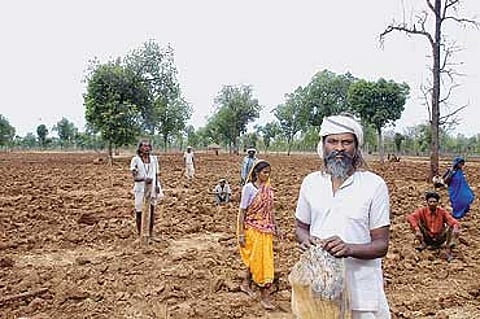Dobjhirna residents say they were farming on the land allotted to the oustees for the last 15 years. "If our land is given to others, how will we survive?" asks Badal Singh. "We would rather die than shift from here. At least our children will be able to live off this land," says Munni Bai.
The forest department, however, says that the Dobjhirna villagers were encroachers and did not have ownership rights to the land they were tilling. "Their names are not on the voters' list of the area. They are listed in another place. How can then they be living here for 15 years?" asks R.P. Singh.
The Dobjhirna residents, however, are unwilling to relent. Scores of them lay down before the tractors brought by the forest department to plough the land in the first week of May. They were beaten up; men and women were dragged away to allow the tractors to move. Imratia, a fragile-looking old woman, describes how she was pulled by five cops in different directions when she refused to budge from in front of the tractors. "A stick was thrust into my nose and I fell unconscious," she shudders. Even children were not spared, they were also kicked and abused. The villagers mounted a protest before the district collector's office at Hoshangabad. The collector, however, refused to intervene, saying the disputed land fell in the jurisdiction of the forest department.
The 90 families of Dobjhirna—all, like the oustees, belonging to the Korku tribe—began to till the land after giving up shifting cultivation. "We found a patch of fallow land and started tilling it. The forest department is not going to replant the forest after evicting us. It will allot our land to another lot of tribals. What have we done to deserve this kind of treatment?" asks Balihar, the village mukhiya. "They are trying to divide the tribals by pitching them against one another", says Sunil Bhai of the Samajwadi Jan Parishad.
As for the forest oustees, they have known only one way of survival—living off the forest produce. "We have no experience of agriculture. I don't know how we will manage," pleads Sindhru, who has a family of seven young children to feed.
Meanwhile, the residents of Churna, the next village to be relocated, are already dreading their future. "Where will I graze my cattle?" asks Ramvati Bai. She takes her animals daily inside the forest for grazing, but at the relocation site, with no forest around, she fears her animals would die.
For a fair majority of the 49 other villages on the shift list, it would be a second eviction in two decades. Many of those facing displacement now were uprooted when a new dam was built on Tawa river. Under the umbrella of a co-operative federation, they are eking out a living by fishing in the Tawa reservoir. And the re-location would deprive them of their means of livelihood.Gangopadhyaya is sure that "some mistake had been made somewhere" in registering the fishing co-operative. "In any case, the contract would not be renewed now," he says.
The Cost Of Tigers
The tigers are vanishing. The government's solution is to make the tribals vanish too. A report from the fields of Madhya Pradesh.


"For the last hundred years, they have been shooing away tribals. Branding them as thieves who are misappropriating forest wealth. The reality is that they are the real owners and protectors of the forests," says Sunil Bhai. Gangopadhyaya isn't so sure: "In my 30 years in the forest department, I have never found tribals as protectors of forest or wildlife. If forests have survived, it is because the demands on the forests were more than made up by natural regeneration. However, as the population grows, the pressure would increase and the forests would suffer."
Forest officials say the relocation was perfectly legal and in keeping with the provisions of the Forest Conservation Act and the Wildlife Protection Act. Moreover, it was being done with the consent of the oustees. "We obtain written consent in advance and the guidelines laid down by the Supreme Court-appointed empowered committee are strictly adhered to", says R.P. Singh. "The consent is obtained by subterfuge," counters Sunil Bhai. "Threat, inducement, everything is used."
Forest officials also argue that the relocation would give the tribals a better life. "It may be unpleasant for them now but it is in their own interest," is R.P. Singh's logic. "There are forest villages which become islands during rains. In some cases, the nearest medical facility is 40 km away." According to Gangopadhyaya, rules prohibit cultivation, construction of schools and hospitals inside forests: "So, life inside forests is not romantic at all. It is a miserable existence."
Meanwhile, the Scheduled Tribes (Recognition of Forest Rights) Bill, 2005, has also run into a storm of controversy. While the Bill has been drafted by the Tribal affairs ministry, the ministry of environment and forests and animal rights activists are fighting it tooth and nail. They say that handing over the rights to the jungle to its tribal dwellers there will entail denotification of vast tracts of forest land and elimination of legal protection for forest cover, a surefire recipe for ecological damage, and increased poaching.
Ramkishore does not agree. Helplessly awaiting relocation from his home and hearth in Dodi village, he mutters a truth that is as unknown to Singh and Gangopadhyaya as he is: "Agar ham nahi rahenge to na to jungle rahega aur na hi janwar rahenge (If we are thrown out, neither the forests nor the animals will survive)."
Tags